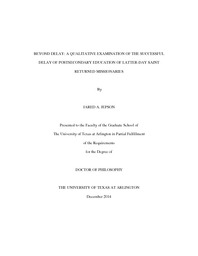
ATTENTION: The works hosted here are being migrated to a new repository that will consolidate resources, improve discoverability, and better show UTA's research impact on the global community. We will update authors as the migration progresses. Please see MavMatrix for more information.
Show simple item record
| dc.contributor.author | Jepson, Jared A. | en_US |
| dc.date.accessioned | 2015-07-01T17:50:20Z | |
| dc.date.available | 2015-07-01T17:50:20Z | |
| dc.date.issued | 2014-12 | |
| dc.date.submitted | January 2014 | en_US |
| dc.identifier.other | DISS-12867 | en_US |
| dc.identifier.uri | http://hdl.handle.net/10106/24908 | |
| dc.description.abstract | This qualitative study fills a void in the research on postsecondary education delayers by examining the postsecondary experiences of six male Latter-day Saint Return Missionaries from the North Texas area who delayed enrolling in college in favor of serving two year missions for The Church of Jesus Christ of Latter-day Saints. As a group, Latter-day Saints have shown to be successful at attaining bachelor's degrees despite the risks of delay. But until this study, little has been understood about their experiences. Using Bronfenbrenner and Morris's (2006) Bioecological Model of Human Development as a conceptual framework for the coding and analysis of the data, findings showed that unlike most delayers, Latter-day Saint delayers tend to exhibit the characteristics of traditional on-time college enrollees, in that they possess academic readiness and momentum (Adelman, 2006). Their decisions to delay college are strongly influenced by their home and church environments. Despite choosing to delay, each participant aspired and expected to earn bachelor's degrees after their missionary service. They were able to do so in under four years from the time of their initial postsecondary enrollment, and despite initially enrolling in community colleges, and transferring to four-year universities, challenges that deter other delayers. Each of the participants perceived the time spent as a missionary was the most significant influence on their degree achievement because of the attributes and skills they developed during that time. Developed skills and attributes included: critical thinking and time management skills; determination and perseverance; leadership and communication skills; maturity and perspective on life; personal accountability and self-discipline; study and lifelong learning skills; and work ethic and capability. In addition, the findings of this study showed that aggressive attendance patterns, and maintaining financial balance through work and financial aid contributed to their success. | en_US |
| dc.description.sponsorship | Tobolowsky, Barbara | en_US |
| dc.language.iso | en | en_US |
| dc.publisher | Education | en_US |
| dc.title | Beyond Delay: A Qualitative Examination Of The Successful Delay Of Postsecondary Education Of Latter-day Saint Returned Missionaries | en_US |
| dc.type | Ph.D. | en_US |
| dc.contributor.committeeChair | Tobolowsky, Barbara | en_US |
| dc.degree.department | Education | en_US |
| dc.degree.discipline | Education | en_US |
| dc.degree.grantor | University of Texas at Arlington | en_US |
| dc.degree.level | doctoral | en_US |
| dc.degree.name | Ph.D. | en_US |
Files in this item
- Name:
- Jepson_uta_2502D_12867.pdf
- Size:
- 2.222Mb
- Format:
- PDF
This item appears in the following Collection(s)
Show simple item record


